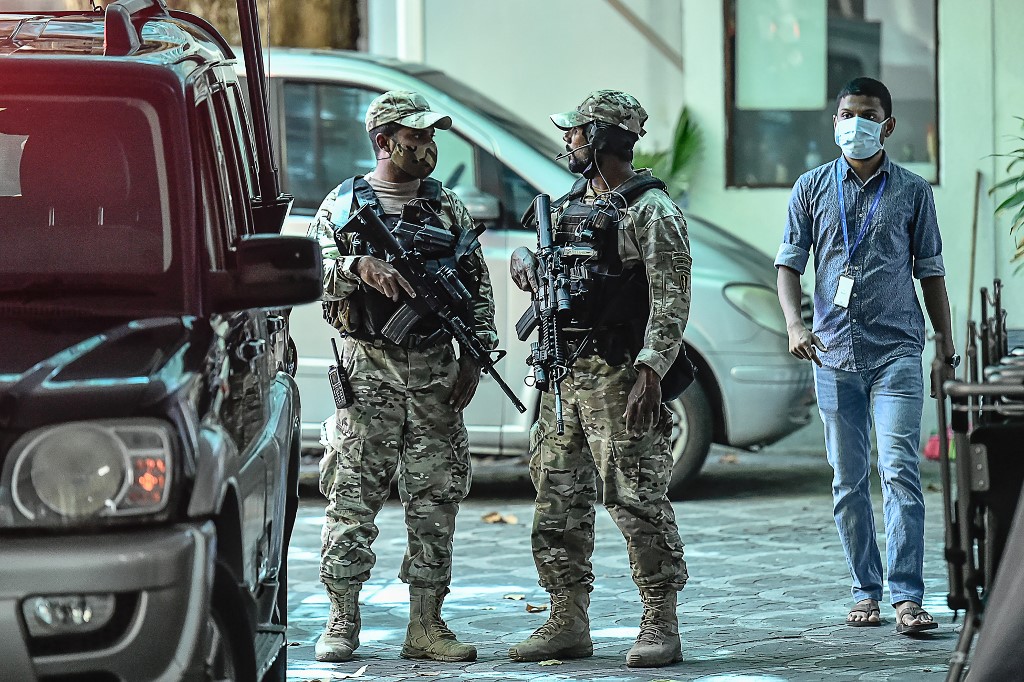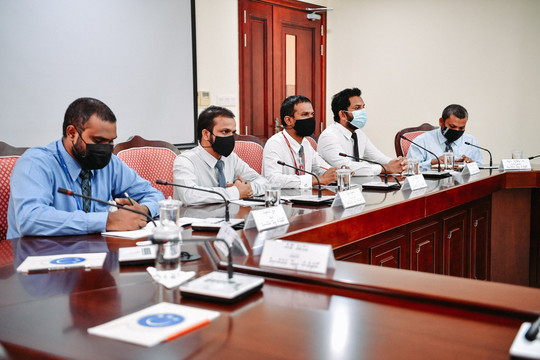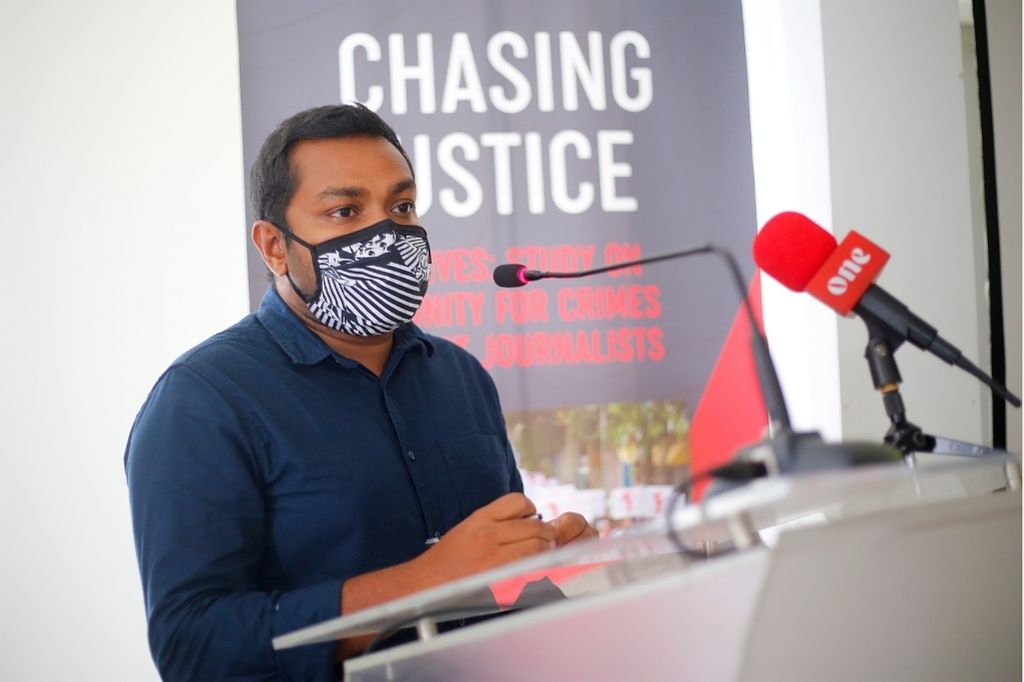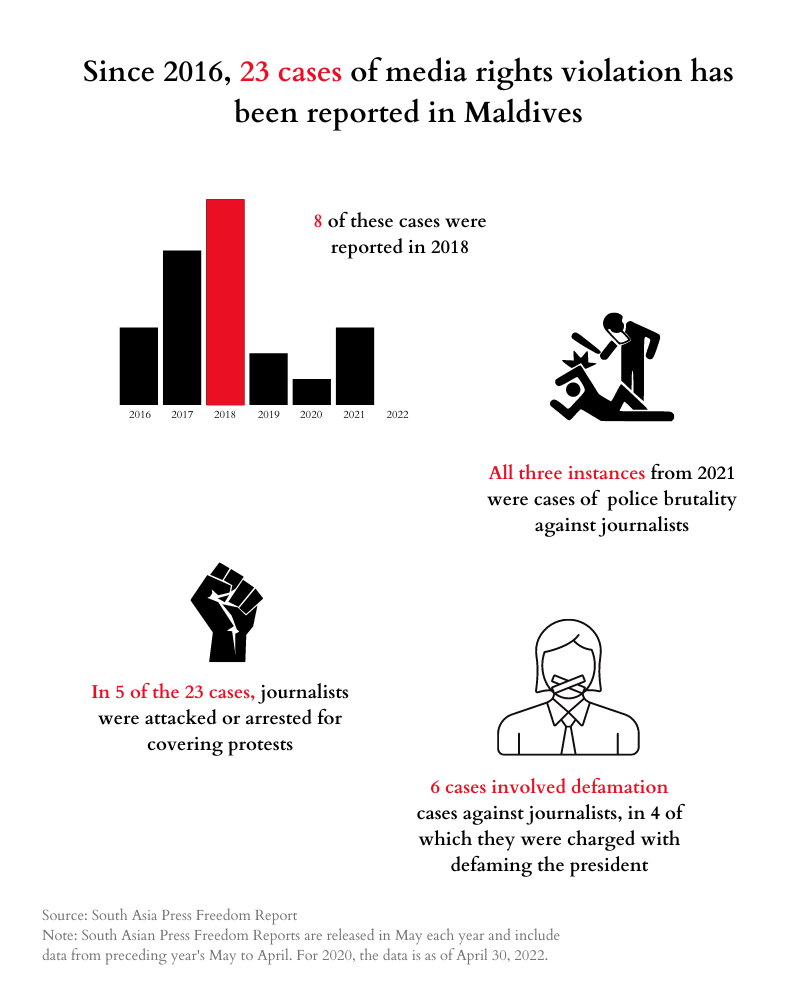MALDIVES
Ebb and Flow

Maldives National Defence Force (MNDF) personnel stand guard in the capital Malé on May 9, 2021, following the attempted assassination of the Maldives’ former president Mohamed Nasheed on May 6. Credit: Hussain Shayaah / AFP
Ebb and Flow
Since the first multi-party elections of the Maldives in 2008, freedom of expression has waxed and waned with the island nation’s democratic fortunes. A relatively free press flourished as 30 years of autocratic rule came to an end and the country solidified upper middle-income status after decades of economic growth driven by high-end tourism. A profusion of new media outlets emerged – often aligned to pro-government or opposition positions, with too few truly independent outfits – while the first democratically elected president Mohamed Nasheed decriminalised defamation.
But the Maldives faced an authoritarian reversal after the overthrow of Nasheed’s government in February 2012 and the subsequent election of Abdulla Yameen in November 2013.
The torching of the opposition aligned Raajje TV’s studio during Yameen’s campaign presaged a dark period of impunity. Journalist Ahmed Rilwan Abdulla was abducted in August 2014 and liberal blogger Yameen Rasheed was stabbed to death in April 2017. Crippling fines were slapped on private broadcasters after defamation was re-criminalised in 2016. In the same year, Haveeru, the country’s oldest newspaper, was shut down by a dubious court judgment over its ownership. Online publication Channel News Maldives (CNM) was forced to close when its sponsor withdrew funding over reports alleging corruption by the first lady. Three Raajje TV staff were also found guilty of obstructing police duty while covering street protests and fined by the criminal court. They became the first journalists to be convicted in more than a decade.
The pro-China strongman’s resounding electoral defeat in 2018 renewed hopes for consolidating democracy in the post Yameen period. Shortly after assuming office, President Ibrahim Mohamed Solih fulfilled campaign pledges to repeal the country’s draconian defamation law and set up an inquiry commission to independently investigate the unresolved cases of Ahmed Rilwan and Yameen Rasheed. New members were appointed to the broadcasting regulator that had previously imposed hefty fines for defamation, including more than USD 230,000 against Raajje TV for allegedly defaming the president.
It is telling that there have since been no cases of murder, physical assault or abduction of journalists by non-state actors. But longstanding challenges remain, chief among them a legacy of impunity and government interference in media regulators, as well as the news media’s reliance on businessmen that has compromised editorial independence and led to further biased and politicised coverage. In what appeared to be a publicity exercise, over MVR 1 million (USD 64,000), was distributed by the President’s Office, to several media outlets to cover and promote government initiatives and President Solih himself.
Living with the virus
The Maldivian economy contracted by an unprecedented 33.5 per cent due to the Covid-19 pandemic, the third biggest drop in the world in 2020. The media’s income fell precipitously as advertising contracts were either suspended or cancelled. Some organisations lost up to 80 per cent of their revenues and most were forced to lay off staff or reduce wages. Websites hosted overseas faced difficulties making payments in US dollars after the Bank of Maldives imposed a USD 250 monthly limit on foreign transactions.
But the economy rebounded strongly after borders reopened in July 2020. Tourism recovered faster than expected and more than 80 per cent of the eligible population was vaccinated. Although the country suffered its worst outbreak and highest death toll in May 2021 – which prompted a partial lockdown of the capital – the situation has largely been stable. Harsher restrictions were not reinstated during a surge driven by the Omicron variant in January 2022, as hospitalisation and deaths remained low. A two-year state of public health emergency was finally lifted on March 13, 2022.
Bolstered by the economic recovery, larger mainstream media outlets have restored salaries to pre-pandemic levels. But smaller newsrooms continue to face financial constraints. Proposals favoured by media management to ensure sustainability include government subsidies, low-cost internet packages and a merit-based process for securing advertising from state-owned companies.
Despite acute financial losses, there were no closures of media houses – an astounding outcome given the relative small size of the market and the economic impacts outlined. Some 268 newspapers and magazines were registered as of August 2021 – up from 219 the previous year. These were predominantly news websites in the local Dhivehi language. In January 2022, the home ministry issued a one-month notice to deregister 51 media outlets if they did not resume publishing regularly. Some 47 inactive outlets were subsequently dissolved on March 10. Licensed broadcasters were operating seven radio stations and 28 television channels as of December 2021. There were 194 accredited journalists with press passes by the end of 2021.
Media Rights Violations
Killings
Arrests
President Ibrahim Mohamed Solih fulfilled campaign pledges to repeal the country’s draconian defamation law and set up an inquiry commission to independently investigate the unresolved cases of Ahmed Rilwan and Yameen Rasheed.

Members of the Maldives Media Council meet on July 9, 2021. Credit: Supplied
Pattern of abuse
Obstruction of journalists at a demonstration against workplace sexual harassment on May 1, 2021, followed “a clear pattern of abuse” by riot police, the Maldives Journalist Association (MJA) observed. They were targeted “to prevent reporting of police activity in protests”, the MJA alleged, urging journalists to report instances of abuse or harassment to a new hotline.
The NGO – which was revived with more than 170 members in 2020 after a six-year hiatus – was in the process of setting up a media rights monitoring programme. On September 19, 2021, Channel 13 journalist Mohamed Samah and cameraman Mohamed Shaheem required treatment for injuries sustained while covering an opposition protest. Both journalists told the MJA that they were “beaten with riot shields by policemen.” Other journalists at the scene accused police officers of ignoring press passes and obstructing coverage.
The failure to hold any police officer accountable underscores the impunity for crimes against journalists. An estimated 50 per cent of journalists had faced death threats and at least seven cases of physical harassment and intimidation were reported to the police over two years, according to a landmark report released by the MJA in collaboration with the International Federation of Journalists (IFJ) in August 2021. But not a single perpetrator had faced justice. A survey on threat perception showed that more than three in five journalists believed criminal gangs were involved in acts that restrict press freedom or endanger the safety of media workers. The IFJ called for “a plan of action to address the issues around freedom of expression”.
Against the odds
The culture of impunity extends to abuse faced by women journalists. The alleged perpetrators of sexual harassment in two high-profile cases that came to light in 2020 – involving Avas Online veteran editor and the former communications secretary at the president’s office – did not face charges despite complaints lodged with the authorities. In a 2021 survey, more than a quarter of female journalists reported facing online intimidation and sexual harassment.
In male-dominated workplaces, women face harassment, discrimination and marginalisation but often do not report incidents out of fear of repercussions, a baseline study released in 2020 by the South Asian Women’s Network found. Women in the media – who account for about 30 per cent of staff in mainstream outlets – reported being side-lined, not recognised for their work and being discouraged from pursuing investigative journalism.
A higher number of male applicants, a perception that media jobs are unstable and a preference to hire men as women ostensibly demanded higher pay and more flexible working arrangements were among reasons offered by stakeholders for the low proportion of women in leadership roles.
But some progress has been made. Paid maternity leave is near universal and several organisations offer flexibility to working mothers. Female journalists have become editors and heads of newsrooms, including women in charge of three television stations. But they succeeded despite the odds, overcoming disadvantages faced by women whose career advancement is imperilled by lengthy leaves of absence to start a family as well as structural barriers created by gender norms that relegate women to the domestic sphere.
A survey on threat perception showed that more than three in five journalists believed criminal gangs were involved in acts that restrict press freedom or endanger the safety of media workers.

Representatives of the Maldives Journalists Association (MJA) speak at the launch of its IFJ supported report, Chasing Justice Maldives: Study on impunity for crimes against journalists, on August 22. Credit: MJA
Dangerous labels
After a long wait for justice, on January 19, 2022, two men were found guilty of murdering blogger Yameen Rasheed and sentenced to life imprisonment. The criminal court acquitted four co-defendants citing insufficient evidence. According to the police, the group of radicalised young men believed that Yameen deserved to be killed for “insulting Islam.”
The slain blogger’s family called on the presidential commission to thoroughly investigate the case. The trial showed that “the authorities’ impartiality and professionalism were compromised during the criminal investigation and prosecution,” the family said, expressing concern with the failure to submit crucial pieces of evidence; investigate intimidation of four witnesses who refused to testify due to threats; investigate local clerics who incited hatred and identify people who financed or ordered the killing.
The presidential commission previously revealed that Yameen Rasheed’s murder had been “organised and financed” by a local extremist group affiliated with al-Qaeda. The same group was allegedly behind the abduction of Minivan News journalist Rilwan in 2014 as well as the attempted murder of blogger Ismail Khilath Rasheed and the assassination of lawmaker Dr Afrasheem Ali in 2012. All four were branded “irreligious” or “secularist” for their outspoken criticism of religious fundamentalism. The ban on the human rights organisation Maldives Democracy Network on 2019 following pressure from religious groups for allegedly being “anti-Islam” was part of this growing trend.
The media’s role in pinning such labels came under scrutiny in the wake of the attempted assassination of former president Nasheed on May 6, 2021. A group of “religious extremists” exploded a bomb to kill the speaker of parliament over alleged anti-Islamic rhetoric, according to the police.
In November 2021, new hate speech provisions were added to the penal code to criminalise accusations of apostasy unless a person explicitly renounces Islam. The portrayal of a Muslim as a nonbeliever over opinions that do not contradict the consensus of scholars became an offence. A section that prohibits “criticism of Islam in a public medium with the intention of causing disregard” was amended to also criminalise publicly insulting or disparaging the Quran, God or Prophet Mohamed.
In June 2021, the government urged by its coalition partner Adhaalath Party, withdrew support for the hate crime bill which seeks to punish those that target anyone as ‘infidel’ or ‘kafir’.
The 2008 Maldives constitution outlaws speech that is “contrary to any tenet of Islam” and the country maintains reservations to the International Covenant on Civil and Political Rights’ article 18 on freedom of thought, conscience and religion. The Communications Authority of Maldives regularly blocks websites with anti-Islamic content upon request by ministries and other agencies. Details of blacklisted sites are not publicly available. In January 2022, local media reported that the police were unsuccessful in enforcing a court order to block Facebook pages and YouTube channels proselytising Christianity with Dhivehi-language content.
The authorities “generally did not restrict or disrupt access to the internet or censor online content, and there were no credible reports that the government monitored private online communications without appropriate legal authority”, according to the Maldives Human Rights Report, 2020 by the US Mission to the Maldives.
But fear of violent reprisal by vigilantes encourages journalists to practice self-censorship. Intimidation and deaths threats also have a chilling effect on free expression online, a formerly vibrant space where digital media evolved and pro-democracy activism thrived. Unlike the early 2000s, freethinking bloggers and users of social media no longer eschew anonymity.
The well-respected publication Maldives Independent in January 2020, which published as Minivan News since 2004, suspended operations without stating any reason.
Likewise, the Bill admitted in the Parliament in February 2022, to clampdown on leader of the opposition and former president Abdullah Yameen’s “India Out” campaign was another example of the government attempting to shape online discourse and muzzle dissent, in view of its ties with India, as outlined in the country’s “India First” policy.
Legal lacuna
A legal framework that subjects media oversight and regulatory bodies to government control was identified as a major weakness in an overview of the media environment released in October 2021. “In essence, where government is determined to quash independent, critical voices, it has a lot of power to do so, although at the same time journalists who are strongly committed to professionalism and independence have always managed to practise in the country,” concluded the report by Canadian human rights organisation Centre for Law and Democracy, together with the IFJ.
The Maldives Broadcasting Commission, which regulates television and radio stations, is comprised of five members appointed by the president with parliamentary approval. When the president’s party has a parliamentary majority, commissioners can be dismissed and replaced at will. The same is true for state media as the Public Service Media company’s board of directors are political appointees. The power of the Communications Authority of Maldives to block websites as well is wielded on political direction in contravention of international standards.
Key recommendations included considering state funding for unprofitable print media, setting up an independent mechanism for accrediting journalists, scrapping the legal requirement for newspapers and magazines to register with the home ministry, and enacting a comprehensive new law for protection of privacy and personal data.
In contrast to other bodies, the Maldives Media Council (MMC), which regulates print and online media, was described as “fairly robustly independent” as eight of its 15 members are elected by media organisations. In July 2021, the IFJ and its local affiliate MJA expressed concern after parliament’s independent institutions committee filed a complaint with the MMC, a body it is tasked with holding accountable. The complaint was made after the Indian High Commission raised concerns about articles and social media posts about its diplomatic staff by opposition-aligned outlet Dhiyares. Lawmakers questioned the MMC about the Dhiyares complaint when the council’s members appeared before the oversight committee over a different issue. “Practices like this will introduce political influences to the work of the MMC, which is legally required to investigate ethics violations impartially,” the MJA warned. The IFJ called on the authorities to “to allow the MMC to fulfil its role without the potential for political influence or pressure.”
In June 2021, the MJA condemned the Ministry of Gender, Family and Social Services for imposing a fine on Avas Online and issuing warnings to three other news websites over alleged child rights violations in their coverage of the murder of a 13-year-old boy. The intervention amounted to a government ministry unilaterally and arbitrarily acting as a media regulator, the MJA contended, objecting to the lack of due process and opportunity for the media outlets to respond.
In a joint statement with the Maldives Editors Guild, Transparency Maldives and Amnesty International in September 2021, the IFJ and MJA called on the authorities to drop a provision in a proposed evidence law that would compel journalists to reveal sources. The constitution guarantees source protection, but the legislation proposed exceptions in cases where a court decides there would be no significant negative impact on the source or the journalist. “The vagueness of the criteria set in the exceptions, along with the near-impossibility of reaching an objective and qualitative assessment on an anonymous source, will lead to a significant reversal of press freedom in the Maldives and carries the risk of generating a wider effect of fear and self-censorship,” the NGOs warned. The Attorney General indicated that the provisions – which he said were based on an Australian model – would be revised to address concerns.
More auspiciously, the 2014 Right to Information Act ranks 16th out of 128 RTI laws in the world. The country’s third Information Commissioner took up his post in September 2021, nearly seven months after the former commissioner resigned. The replacement process dragged on due to disagreements among lawmakers on parliament’s vetting committee.
A record 104 complaints were submitted to the Information Commissioner’s Office in 2021, up from 53 the previous year. Most cases involved failure of information officers at ministries and state-owned enterprises to respond within the mandatory 21-day period. In February 2022, the Supreme Court overruled the High Court’s refusal to hear appeals against decisions made by the Information Commissioner’s Office, paving the way for legal challenges against orders to disclose information.
Faithful and effective implementation of these much-vaunted laws is what has been sorely missing in the Maldives. Political will is the key to unlocking their benefits and upholding constitutional guarantees of safety, gender equality and fundamental rights.
Fear of violent reprisal by vigilantes encourages journalists to practice self-censorship. Intimidation and deaths threats also have a chilling effect on free expression online, a formerly vibrant space where digital media evolved and pro-democracy activism thrived.

